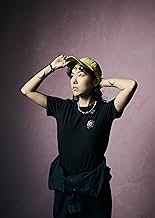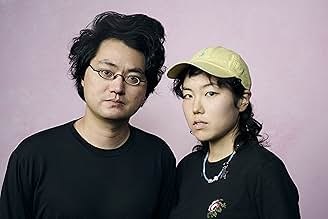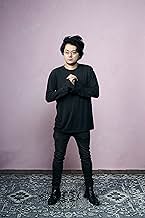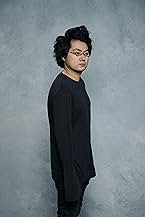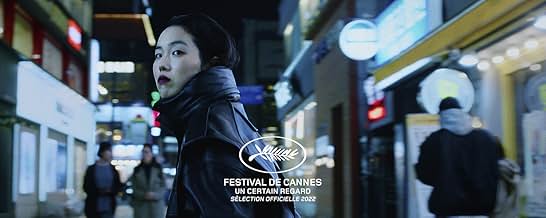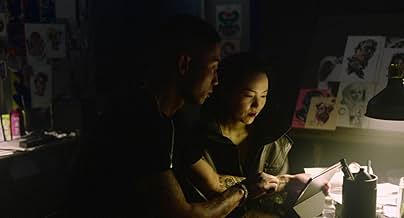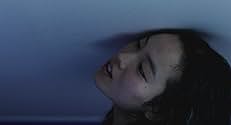A twenty-five-year-old French woman returns to Korea, the country she was born in before being adopted by a French couple, for the very first time. She decides to track down her biological p... Read allA twenty-five-year-old French woman returns to Korea, the country she was born in before being adopted by a French couple, for the very first time. She decides to track down her biological parents, but her journey takes a surprising turn.A twenty-five-year-old French woman returns to Korea, the country she was born in before being adopted by a French couple, for the very first time. She decides to track down her biological parents, but her journey takes a surprising turn.
- Awards
- 10 wins & 25 nominations total
Heo Jin
- Grandmother
- (as Jin Heo)
Régine Vial
- Gisèle Benoît
- (as Régine Vial Goldberg)
Shin Dong-ho
- Tena's Father
- (as Dong-ho Shin)
Featured reviews
Return to Seoul is an ambitious film, telling the story of a young woman named Freddie, who was born to Korean parents, but grew up in France. She - you guessed it - returns to Seoul, partly motivated to search for them, in her early to mid-20s. From there, the movie plays out sort of the way you'd expect for a while... until it makes some interesting narrative decisions, spanning far more time than I'd expected it would. As such, we get an insight into Freddie and the ways she changes throughout her 20s and into her early 30s.
Tonally, it's very different from The Worst Person in the World, but I got flashes of that film from this; maybe it scratched a similar itch. Each looks at a troubled & flawed, yet interesting, compelling, and sympathetic young protagonist, each spans quite a long period of time, each explores loneliness and the trials and tribulations of early adulthood in a very hard-hitting way, and each is quite visually striking. But like I said, they're tonally different, given Return to Seoul is more of a straightforward drama than a romantic-dramedy, and it gets darker and more in-depth with its exploration of loneliness (which hits extra hard, given what the world's been through since the start of the 2020s).
It's not always clear where the film is going, and some of the decisions it makes are quite jarring (though most work for the story and characters, once the shock wears off). The pacing is quite slow, but the compelling main character, the visually pleasing look of the film, and the amazing acting kept me engaged for almost all of its two-hour runtime. Park Ji-Min gives one of the best performances of 2022, and I was shocked to read this is her first ever movie. A performance like this that's so central makes or breaks this kind of character-focused film, and thankfully, she's up to the task and then some.
This might not be everyone's cup of tea, but I liked it a lot. While it was deliberately-paced, it never lost me, and I found some of the scenes quite moving. It's a very good movie; hopefully it won't go under too many people's radars, as Awards Season ramps up.
Tonally, it's very different from The Worst Person in the World, but I got flashes of that film from this; maybe it scratched a similar itch. Each looks at a troubled & flawed, yet interesting, compelling, and sympathetic young protagonist, each spans quite a long period of time, each explores loneliness and the trials and tribulations of early adulthood in a very hard-hitting way, and each is quite visually striking. But like I said, they're tonally different, given Return to Seoul is more of a straightforward drama than a romantic-dramedy, and it gets darker and more in-depth with its exploration of loneliness (which hits extra hard, given what the world's been through since the start of the 2020s).
It's not always clear where the film is going, and some of the decisions it makes are quite jarring (though most work for the story and characters, once the shock wears off). The pacing is quite slow, but the compelling main character, the visually pleasing look of the film, and the amazing acting kept me engaged for almost all of its two-hour runtime. Park Ji-Min gives one of the best performances of 2022, and I was shocked to read this is her first ever movie. A performance like this that's so central makes or breaks this kind of character-focused film, and thankfully, she's up to the task and then some.
This might not be everyone's cup of tea, but I liked it a lot. While it was deliberately-paced, it never lost me, and I found some of the scenes quite moving. It's a very good movie; hopefully it won't go under too many people's radars, as Awards Season ramps up.
I think I may have warmed to this film better had I not taken an instant dislike to "Freddie" (Park Ji-min). Now it's certainly a testament to this actor that she is able to successfully - and pretty immediately - engender a sense that her character is a rather selfish, manipulative and unpleasant individual; but I'm afraid I struggled to remain engaged as her troubled story of adoption and of her re-introduction to her birth family is played out over the next two hours. "Freddie" appears to have been happily brought up by a couple in France, so her increasingly thoughtless behaviour doesn't really have an anchor - and as we progress and she becomes more obnoxious - as exemplified by her final scene in the car with poor old "Maxime" (Yoann Zimmer) - I found the story has just about run out of merit. The acting is generally good. The efforts from her slightly dipso dad (Oh Kwang-rok) is convincing as he has to reconcile the discovery of his long-lost daughter with his dependency on the bottle and her own pretty obvious disdain for the man. It also offers us quite an interesting insight into just how adoptions worked as the decline of the French colonial system in post-war Korea led to many children being offered by parents who hoped that a childhood and education in France would offer greater opportunity, but again with "Freddie" that isn't really developed. What has turned her into this rather objectionable person is rather left aside. It has an element of "be careful what you wish for" to it, and is, at times, an interesting observation on the stresses of the post-adoption processes but I just didn't like or care about her and so my enthusiasm just waned.
As an audience member, films that cover the topic of adoption, there are expected themes of identity involved. But instead we get more of a random style of set-pieces within the conventional moments that represented identity in a unique way.
For the most part, it worked for the character and the story. But there were some that I just couldn't get on board with and some were even so random they were unforgivable.
I really liked Park Ji-Min's performance. I enjoyed the attitude that she gave to the leading character and the spontaneous moments that she orchestrated were largely memorable and one of the strongest parts of the film.
I liked the overall look. It was able to give us some effective imagery in different environments and never feel like different films.
The pacing was gentle. There were some purposeful lingering shots which worked well for the most part. Also, the camerawork was respectful with its wide shots as it let the pictures do the talking instead of taking over and turning it into something that wasn't intended.
As mentioned, I wasn't invested with every decision made. Some of the choices in the narrative in the second half made no sense to me. There were others I appreciated, but just wasn't a fan of them.
Despite that, I thought this was still a good enough drama that was worth my time. It's got a solid leading performance that you're willing to invest in. It also poses some interesting representations on the themes of identity that I've not seen before.
I cannot forgive some of the random moments in the second half. But nevertheless, there was enough engrossing moments to keep me guessing how this would end.
For the most part, it worked for the character and the story. But there were some that I just couldn't get on board with and some were even so random they were unforgivable.
I really liked Park Ji-Min's performance. I enjoyed the attitude that she gave to the leading character and the spontaneous moments that she orchestrated were largely memorable and one of the strongest parts of the film.
I liked the overall look. It was able to give us some effective imagery in different environments and never feel like different films.
The pacing was gentle. There were some purposeful lingering shots which worked well for the most part. Also, the camerawork was respectful with its wide shots as it let the pictures do the talking instead of taking over and turning it into something that wasn't intended.
As mentioned, I wasn't invested with every decision made. Some of the choices in the narrative in the second half made no sense to me. There were others I appreciated, but just wasn't a fan of them.
Despite that, I thought this was still a good enough drama that was worth my time. It's got a solid leading performance that you're willing to invest in. It also poses some interesting representations on the themes of identity that I've not seen before.
I cannot forgive some of the random moments in the second half. But nevertheless, there was enough engrossing moments to keep me guessing how this would end.
Return to Seoul: A stranger in a strange land, adopted as a bay from South Korea and raised in France, 25 year old Freddie (Ji-Min Park) returns. It is a bit of a culture shock but she quickly makes friends. She is persuaded to contact her birth parents through the adoption agency and eventually her father responds. All does not go swimmingly especially as Freddie's free spirit clashes with Korean reticence and patriarchal norms. Freddie herself however is self-centred and even cruel to friends and family. The film captures snapshots her life for her first two weeks as an returnee in Korea, two years later, five years after that and finally a year later, eight years since her first return visit. She develops in some ways, degenerates in others. An interesting tale of loss, acceptance, search for identity and longing on the part of Freddie. Directed and written by Davy Chou. 8/10.
What stands out the most about this film is its refusal to take the easy route. While viewers may think they can predict the direction after the first act, they are mistaken. The narrative defies predictability, mirroring the unpredictable nature of wounded souls and those who never feel truly at home.
The protagonist's actions may seem foolish, but what truly captivates is the striking humanity portrayed with raw realism, making it impossible to abandon the desire and hope for her to find solace within. I was left speechless when I found out that this is Ji-Min Park's debut role. A role that made me shed tears on more than one occasion and that is her merit in making us see so well that everything she is, is the result of her life's circumstances.
The experiende Oh Gwan-rok, in the role of the biological father, is also outstanding, but this is not just a film of performances. It boasts brilliant scenes, expertly paced storytelling, daring technical choices, and a secure, risk-taking direction, all complemented by a flawless soundtrack.
PS: The main theme of this and the one of "Decision to Leave" are two haunting melodies that linger in my mind, compelling me to delve deeper into the history of South Korean music.
The protagonist's actions may seem foolish, but what truly captivates is the striking humanity portrayed with raw realism, making it impossible to abandon the desire and hope for her to find solace within. I was left speechless when I found out that this is Ji-Min Park's debut role. A role that made me shed tears on more than one occasion and that is her merit in making us see so well that everything she is, is the result of her life's circumstances.
The experiende Oh Gwan-rok, in the role of the biological father, is also outstanding, but this is not just a film of performances. It boasts brilliant scenes, expertly paced storytelling, daring technical choices, and a secure, risk-taking direction, all complemented by a flawless soundtrack.
PS: The main theme of this and the one of "Decision to Leave" are two haunting melodies that linger in my mind, compelling me to delve deeper into the history of South Korean music.
Did you know
- TriviaThe movie is based on the life of Laure Badufle, a friend of director Davy Chou. Like Freddie, she was born in South Korea, stayed a year there before being adopted in France. At age 23, she came back and lived for two years there before returning to France. A few years after that, Chou accompanied her to South Korea, when they met her biological father and grandmother. According to him, the meeting was full of emotions, of regret and bad communication, with the translator struggling to convey Badufle's anger into polite Korean.
- SoundtracksPetals
Written by Shin Jung-Hyun
Performed by Lee Junh-Hwa
- How long is Return to Seoul?Powered by Alexa
Details
- Release date
- Countries of origin
- Official site
- Languages
- Also known as
- Повернення в Сеул
- Filming locations
- Production companies
- See more company credits at IMDbPro
Box office
- Budget
- €2,200,000 (estimated)
- Gross US & Canada
- $798,774
- Opening weekend US & Canada
- $27,315
- Feb 19, 2023
- Gross worldwide
- $2,175,376
- Runtime1 hour 59 minutes
- Color
- Aspect ratio
- 1.85 : 1
Contribute to this page
Suggest an edit or add missing content




